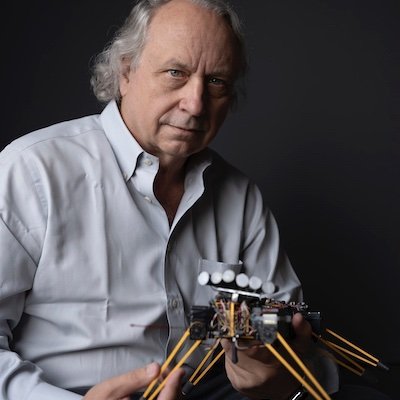
Rodney Brooks
Distinguishing hype-notism from plausibility one press release at a time.
5 Book Recommendations by Rodney Brooks
The Knowledge Machine
Michael Strevens
A paradigm-shifting work that revolutionizes our understanding of the origins and structure of science.Michael Strevens' book The Knowledge Machine about invention of science. Recounts Thales saying everything was made of water & his student saying air & "Where Thales once surveyed the horizon and saw water, our radio telescopes look into deep space and see dark matter." Superb!!
Giant brains; or, Machines that think
Edmund Callis Berkeley
Good analysis of upcoming robots; whether humans can keep control, whether mankind needs to act before they are too powerful, their impact on unemployment, and how to tax them. In a book by Edmund Berkeley, "Giant Brains or machines that think", Wiley, 1949.
Problem Solving Methods in Artificial Intelligence
Nils J. Nilsson
Nils Nilsson (former Stanford CS Chair) has passed away. He lead the Shakey robot project at SRI in the 1960s, *after* his 1965 book "Learning Machines". My 1972 introduction to AI research was his 1971 book "Problem-Solving Methods in AI". Thank you Nils!!! RIP.
Factfulness
Hans Rosling
INSTANT NEW YORK TIMES BESTSELLER “One of the most important books I’ve ever read—an indispensable guide to thinking clearly about the world.” – Bill Gates “Hans Rosling tells the story of ‘the secret silent miracle of human progress’ as only he can. But Factfulness does much more than that. It also explains why progress is so often secret and silent and teaches readers how to see it clearly.” —Melinda Gates "Factfulness by Hans Rosling, an outstanding international public health expert, is a hopeful book about the potential for human progress when we work off facts rather than our inherent biases." - Former U.S. President Barack Obama Factfulness: The stress-reducing habit of only carrying opinions for which you have strong supporting facts. When asked simple questions about global trends—what percentage of the world’s population live in poverty; why the world’s population is increasing; how many girls finish school—we systematically get the answers wrong. So wrong that a chimpanzee choosing answers at random will consistently outguess teachers, journalists, Nobel laureates, and investment bankers. In Factfulness, Professor of International Health and global TED phenomenon Hans Rosling, together with his two long-time collaborators, Anna and Ola, offers a radical new explanation of why this happens. They reveal the ten instincts that distort our perspective—from our tendency to divide the world into two camps (usually some version of us and them) to the way we consume media (where fear rules) to how we perceive progress (believing that most things are getting worse). Our problem is that we don’t know what we don’t know, and even our guesses are informed by unconscious and predictable biases. It turns out that the world, for all its imperfections, is in a much better state than we might think. That doesn’t mean there aren’t real concerns. But when we worry about everything all the time instead of embracing a worldview based on facts, we can lose our ability to focus on the things that threaten us most. Inspiring and revelatory, filled with lively anecdotes and moving stories, Factfulness is an urgent and essential book that will change the way you see the world and empower you to respond to the crises and opportunities of the future. --- “This book is my last battle in my life-long mission to fight devastating ignorance...Previously I armed myself with huge data sets, eye-opening software, an energetic learning style and a Swedish bayonet for sword-swallowing. It wasn’t enough. But I hope this book will be.” Hans Rosling, February 2017."Factfulness" by Hans Rosling et al, has changed my understanding of the world. It uses data to show me where and how I was wrong, and identifies 10 ways us humans consistently and wrongly misunderstand so many things. Please read it. https://t.co/oXj0zRCXnE
The Fatal Shore
Robert Hughes
Draws on diverse original materials to recount the European settlement of Australia, from the 1788 landing of the first prison fleet to 1868@bfeld Best history book on Australia? The Fatal Shore, by Robert Hughes. 1986.